-
 Bitcoin
Bitcoin $85,033.2005
2.47% -
 Ethereum
Ethereum $1,906.7088
3.81% -
 Tether USDt
Tether USDt $1.0000
0.01% -
 XRP
XRP $2.1314
0.80% -
 BNB
BNB $607.5101
0.18% -
 Solana
Solana $126.8044
0.76% -
 USDC
USDC $1.0000
0.01% -
 Dogecoin
Dogecoin $0.1719
2.68% -
 Cardano
Cardano $0.6765
2.19% -
 TRON
TRON $0.2368
-1.06% -
 Toncoin
Toncoin $4.0166
-1.86% -
 Chainlink
Chainlink $14.1580
3.45% -
 UNUS SED LEO
UNUS SED LEO $9.3617
2.34% -
 Stellar
Stellar $0.2738
2.56% -
 Avalanche
Avalanche $19.3896
2.91% -
 Sui
Sui $2.4172
5.81% -
 Shiba Inu
Shiba Inu $0.0...01271
1.74% -
 Hedera
Hedera $0.1702
2.79% -
 Polkadot
Polkadot $4.1641
2.08% -
 Litecoin
Litecoin $84.6894
0.83% -
 MANTRA
MANTRA $6.2492
0.03% -
 Bitcoin Cash
Bitcoin Cash $309.7232
1.62% -
 Bitget Token
Bitget Token $4.6160
2.70% -
 Dai
Dai $1.0001
0.01% -
 Ethena USDe
Ethena USDe $0.9999
-0.01% -
 Pi
Pi $0.7154
-2.35% -
 Hyperliquid
Hyperliquid $13.1020
-0.74% -
 Monero
Monero $216.3813
0.26% -
 Uniswap
Uniswap $6.2153
3.35% -
 Aptos
Aptos $5.3534
0.62%
Does Bitcoin spot trading require identity verification
KYC/AML requirements for Bitcoin spot trading vary by exchange; reputable platforms enforce them to prevent illicit activities, while smaller ones may not, increasing risk.
Mar 31, 2025 at 06:08 am
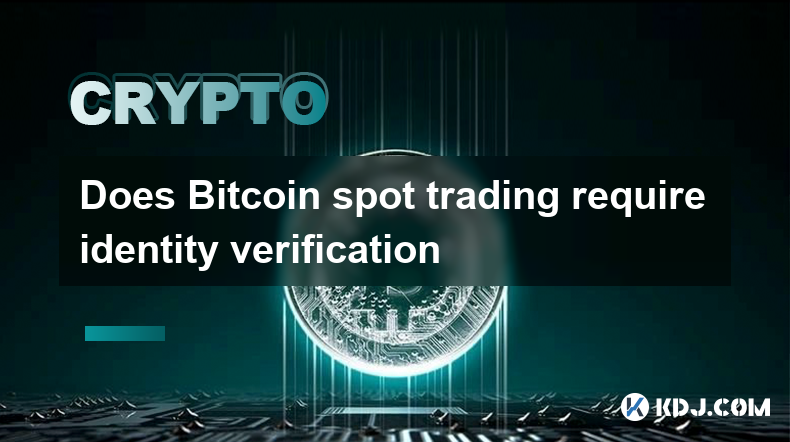
?
Understanding KYC/AML Regulations in Crypto Exchanges
The question of whether Bitcoin spot trading requires identity verification hinges largely on the exchange you're using. There's no universal requirement for identity verification to trade Bitcoin spot. However, most reputable and larger exchanges operating globally implement Know Your Customer (KYC) and Anti-Money Laundering (AML) procedures. These are regulatory requirements designed to prevent illicit activities like money laundering and terrorist financing.
These regulations vary significantly by jurisdiction. Exchanges operating in countries with strict financial regulations, such as the US, UK, and many EU nations, are far more likely to enforce stringent KYC/AML policies. This means you'll almost certainly need to verify your identity before you can trade. This usually involves providing government-issued identification, proof of address, and sometimes additional documentation.
Smaller exchanges or those operating in jurisdictions with less stringent regulations might not require KYC/AML verification. However, using such exchanges carries significant risks. These exchanges may be more susceptible to scams, hacks, and other security vulnerabilities. Furthermore, the lack of KYC/AML procedures could make it easier for illicit funds to flow through the platform.
The Process of Identity Verification on Crypto Exchanges
The identity verification process typically involves several steps. These steps can vary slightly depending on the specific exchange.
- Account Registration: You begin by creating an account on the chosen exchange. This usually involves providing a username, password, and email address.
- Identity Verification: After registration, the exchange will prompt you to verify your identity. This usually involves uploading clear images or scans of your government-issued ID, such as a passport, driver's license, or national ID card.
- Address Verification: You will also be required to provide proof of your residential address. This might involve uploading a utility bill, bank statement, or other official document showing your address.
- Verification Process: The exchange will review your submitted documents. This process can take anywhere from a few minutes to several days, depending on the exchange's workload and verification procedures.
- Account Activation: Once your documents are verified, your account will be fully activated, and you can start trading Bitcoin spot.
Trading Bitcoin Spot Without KYC/AML
While some exchanges may not require KYC/AML, it's crucial to understand the risks involved. Trading on unregulated exchanges exposes you to a higher risk of scams, hacks, and potential legal issues. Your funds might be at greater risk, and you may not have any recourse if something goes wrong.
Furthermore, even if an exchange doesn't explicitly require KYC/AML, they may still monitor transactions for suspicious activity. If they detect unusual patterns, they might still freeze your account or report you to the authorities. Therefore, even on exchanges that appear to be less regulated, it's advisable to maintain transparency and follow best practices to minimize risks.
Peer-to-Peer (P2P) Bitcoin Trading and Identity Verification
Peer-to-peer (P2P) platforms offer a different approach to Bitcoin trading. These platforms act as intermediaries, connecting buyers and sellers directly. The level of identity verification on P2P platforms can vary significantly. Some platforms may not require any verification, while others may require some level of identity verification to ensure the safety and security of transactions.
However, it's important to note that P2P trading often involves a higher degree of risk compared to using regulated exchanges. You are responsible for conducting your own due diligence on the counterparty, and there is a higher risk of scams and fraud. The lack of a central regulatory body means you have less protection in case of disputes or losses.
The Importance of Choosing a Reputable Exchange
Regardless of whether an exchange requires KYC/AML, selecting a reputable and secure exchange is paramount. Look for exchanges with a strong track record, robust security measures, and positive user reviews. Consider factors such as the exchange's history, its security protocols, its customer support, and its regulatory compliance. A reputable exchange will typically have clear and transparent policies regarding KYC/AML procedures.
Frequently Asked Questions
Q: Is it illegal to trade Bitcoin without verifying my identity?
A: It's not necessarily illegal, but it depends on the jurisdiction and the exchange you use. Many exchanges are legally obligated to perform KYC/AML checks, and trading on those exchanges without verification would violate their terms of service. However, some jurisdictions may not have regulations requiring KYC/AML for all cryptocurrency exchanges.
Q: What happens if I don't verify my identity on an exchange that requires it?
A: You likely won't be able to trade. The exchange will either restrict your account functionality or completely block your access until you complete the verification process.
Q: Are there any benefits to trading Bitcoin without KYC?
A: The primary perceived benefit is increased privacy. However, this comes at a significant cost in terms of security and potential legal risks.
Q: What are the risks of using an exchange that doesn't require KYC?
A: The risks include increased vulnerability to scams and hacks, lack of recourse if something goes wrong, and potential legal repercussions.
Q: How long does the identity verification process usually take?
A: This varies greatly depending on the exchange and the volume of verification requests they receive. It can range from a few minutes to several days.
Q: What types of identification documents are typically accepted for verification?
A: Most exchanges accept government-issued identification documents such as passports, driver's licenses, and national ID cards. Proof of address is usually required as well.
Disclaimer:info@kdj.com
The information provided is not trading advice. kdj.com does not assume any responsibility for any investments made based on the information provided in this article. Cryptocurrencies are highly volatile and it is highly recommended that you invest with caution after thorough research!
If you believe that the content used on this website infringes your copyright, please contact us immediately (info@kdj.com) and we will delete it promptly.
- Ripple (26) and Ripple (27) wallets each unlock 1 billion XRP
- 2025-04-02 03:25:12
- RUVI Emerges as a Fresh, Innovative Player in the Crypto Space Combining Artificial Intelligence with Blockchain Technology
- 2025-04-02 03:25:12
- Zcash Surges 10%, Monero Proves Steady—But BlockDAG's Beta Testnet Out-performs Both By Reaching 110K Wallets
- 2025-04-02 03:20:12
- PEPE Price Gears Up for a Potential Bullish Breakout
- 2025-04-02 03:20:12
- Alabama Senator Tommy Tuberville Will Reintroduce a Bill Aimed at Allowing Americans to Add Cryptocurrency to Their Retirement Savings Plans
- 2025-04-02 03:15:12
- Solana (SOL) Price Prediction: Modest Recovery Sparks Hopes of a Significant Price Upturn
- 2025-04-02 03:15:12
Related knowledge
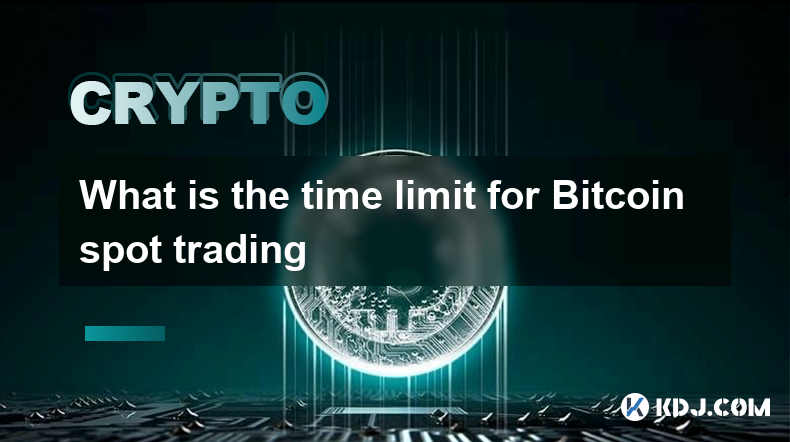
What is the time limit for Bitcoin spot trading
Mar 30,2025 at 10:43am
? There's no single, universally applicable 'time limit' for Bitcoin spot trading. Unlike futures contracts which have defined expiration dates, spot trading involves the immediate exchange of Bitcoin for fiat currency (or vice versa). The transaction is executed almost instantly, pending confirmation on the Bitcoin blockchain. However, several factors ...

Does Bitcoin spot trading require identity verification
Mar 31,2025 at 06:08am
? Understanding KYC/AML Regulations in Crypto ExchangesThe question of whether Bitcoin spot trading requires identity verification hinges largely on the exchange you're using. There's no universal requirement for identity verification to trade Bitcoin spot. However, most reputable and larger exchanges operating globally implement Know Your Customer (KYC...
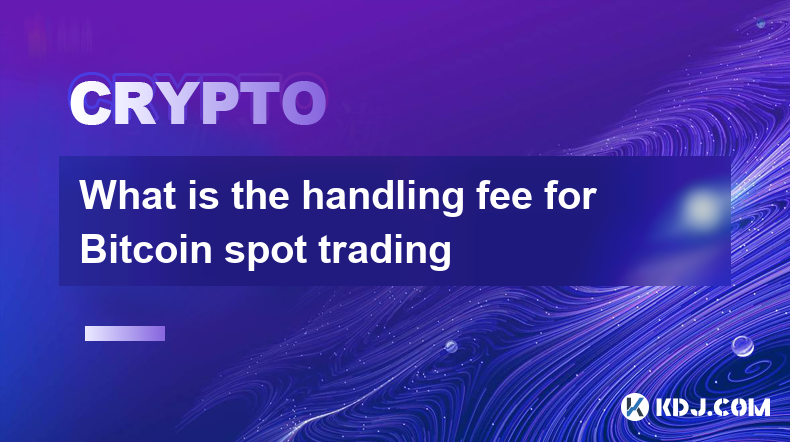
What is the handling fee for Bitcoin spot trading
Apr 02,2025 at 12:28am
? Understanding Bitcoin Spot Trading FeesBitcoin spot trading involves the immediate exchange of Bitcoin for another currency, typically fiat money like USD or another cryptocurrency. Unlike futures or derivatives trading, spot trading executes the transaction at the current market price. The handling fee, therefore, covers the services provided by the ...
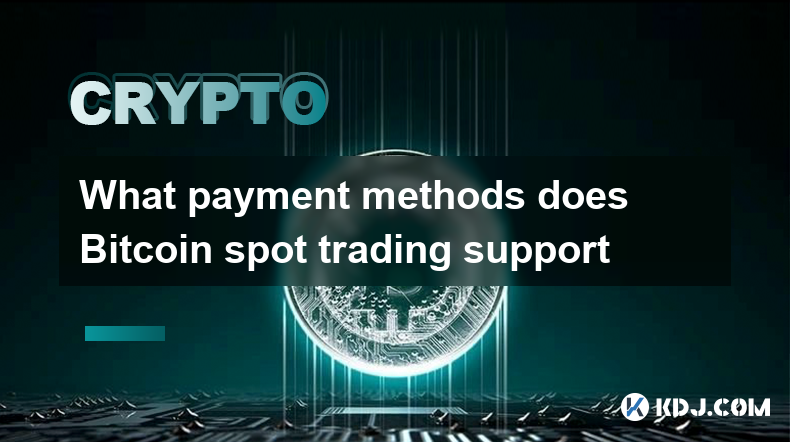
What payment methods does Bitcoin spot trading support
Mar 30,2025 at 12:43pm
? Understanding Bitcoin Spot Trading Payment MethodsBitcoin spot trading refers to the immediate exchange of Bitcoin (BTC) for another currency, typically fiat money like USD, EUR, or another cryptocurrency. Unlike futures or derivatives trading, spot trading involves the actual transfer of Bitcoin at the current market price. The payment methods accept...
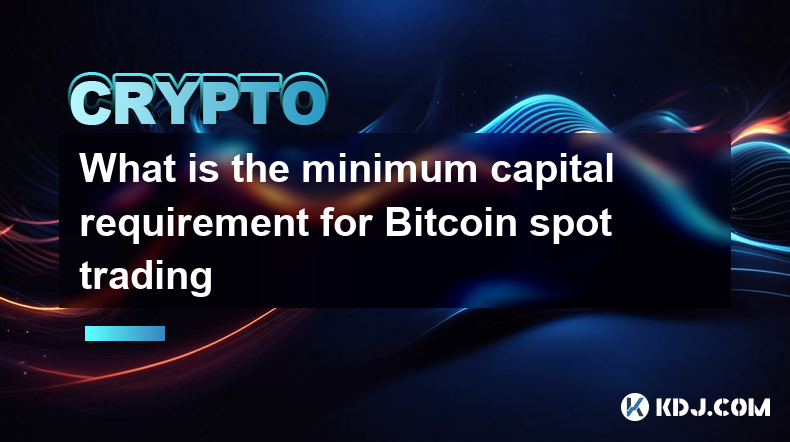
What is the minimum capital requirement for Bitcoin spot trading
Apr 01,2025 at 06:50pm
? Understanding Bitcoin Spot Trading and Capital RequirementsBitcoin spot trading refers to the immediate exchange of Bitcoin for another currency, typically fiat money like USD or another cryptocurrency. Unlike futures or derivatives trading, spot trading involves the actual ownership of Bitcoin at the moment of the transaction. There's no speculation ...
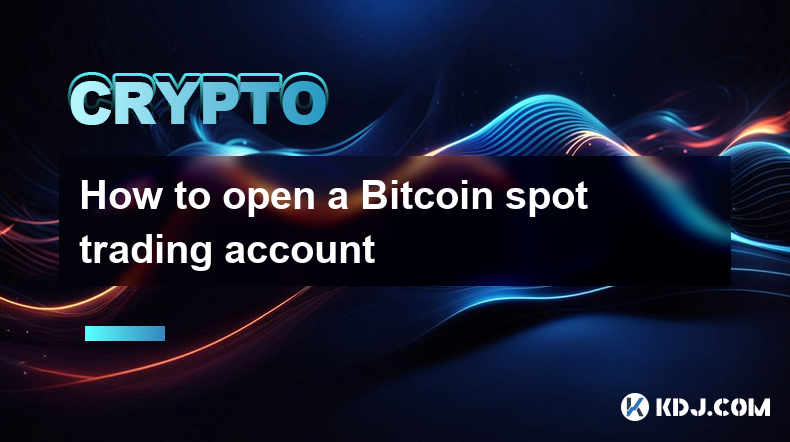
How to open a Bitcoin spot trading account
Mar 29,2025 at 12:43pm
Choosing the Right ExchangeOpening a Bitcoin spot trading account involves selecting a reputable cryptocurrency exchange. Several factors are crucial here. Consider the exchange's security features – look for two-factor authentication (2FA) and robust security protocols. Examine trading fees, as these can significantly impact your profits. Check the av...

What is the time limit for Bitcoin spot trading
Mar 30,2025 at 10:43am
? There's no single, universally applicable 'time limit' for Bitcoin spot trading. Unlike futures contracts which have defined expiration dates, spot trading involves the immediate exchange of Bitcoin for fiat currency (or vice versa). The transaction is executed almost instantly, pending confirmation on the Bitcoin blockchain. However, several factors ...

Does Bitcoin spot trading require identity verification
Mar 31,2025 at 06:08am
? Understanding KYC/AML Regulations in Crypto ExchangesThe question of whether Bitcoin spot trading requires identity verification hinges largely on the exchange you're using. There's no universal requirement for identity verification to trade Bitcoin spot. However, most reputable and larger exchanges operating globally implement Know Your Customer (KYC...

What is the handling fee for Bitcoin spot trading
Apr 02,2025 at 12:28am
? Understanding Bitcoin Spot Trading FeesBitcoin spot trading involves the immediate exchange of Bitcoin for another currency, typically fiat money like USD or another cryptocurrency. Unlike futures or derivatives trading, spot trading executes the transaction at the current market price. The handling fee, therefore, covers the services provided by the ...

What payment methods does Bitcoin spot trading support
Mar 30,2025 at 12:43pm
? Understanding Bitcoin Spot Trading Payment MethodsBitcoin spot trading refers to the immediate exchange of Bitcoin (BTC) for another currency, typically fiat money like USD, EUR, or another cryptocurrency. Unlike futures or derivatives trading, spot trading involves the actual transfer of Bitcoin at the current market price. The payment methods accept...

What is the minimum capital requirement for Bitcoin spot trading
Apr 01,2025 at 06:50pm
? Understanding Bitcoin Spot Trading and Capital RequirementsBitcoin spot trading refers to the immediate exchange of Bitcoin for another currency, typically fiat money like USD or another cryptocurrency. Unlike futures or derivatives trading, spot trading involves the actual ownership of Bitcoin at the moment of the transaction. There's no speculation ...

How to open a Bitcoin spot trading account
Mar 29,2025 at 12:43pm
Choosing the Right ExchangeOpening a Bitcoin spot trading account involves selecting a reputable cryptocurrency exchange. Several factors are crucial here. Consider the exchange's security features – look for two-factor authentication (2FA) and robust security protocols. Examine trading fees, as these can significantly impact your profits. Check the av...
See all articles























































































